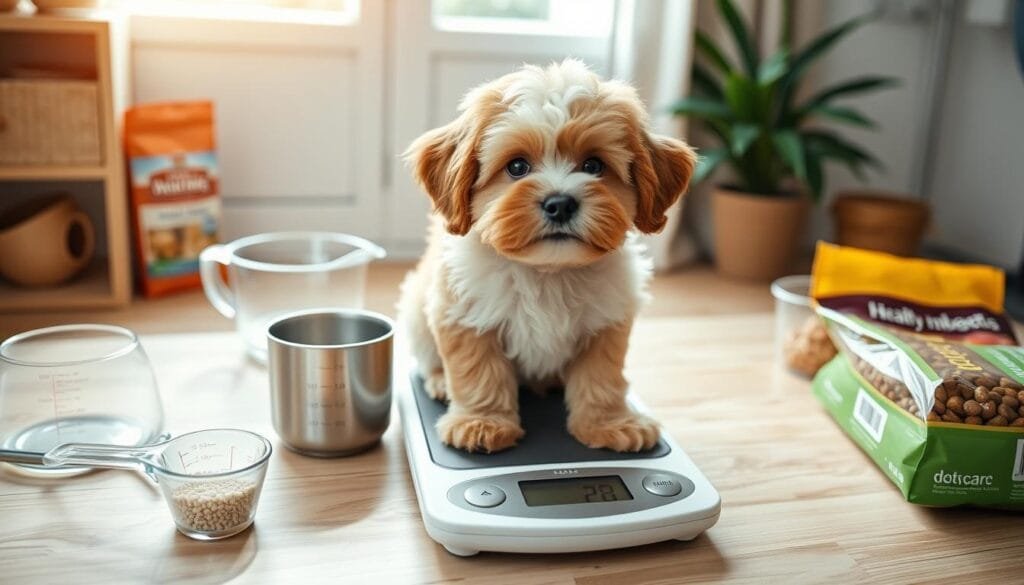Are you worry that your small dog is overweight and may cause health issue? Many pet owners that have small dog find it’s hard to balance their dog’s weight and avoid their small dog to have too much exercise. Too much exercise will hurt their small joints. So how to prevent obesity in small breeds without over-exercising them. To prevent obesity, you need to think carefully about what they eat and how much they move.
Keeping your small dog at a healthy weight is very important for his/her health. If your small dog gain too much weight, it may cause serious of health issue like joint problem, breathing issues, and diabetes. Since his/her body is small, it gets little tricky on the amount of foods and types of foods you can feed your small dog to prevent obesity.
In this article, we’ll look at ways to help your small dog stay healthy without too much exercise. We’ll talk about the best foods and activities that are easy on their body. You’ll learn how to keep your little dog fit and happy without stressing them out. Let’s get started and find the best way to care for your small breed!
Key Takeaways
- Understanding the unique nutritional needs of small dog breeds is essential for preventing obesity.
- Portion control and feeding schedules play a crucial role in canine weight loss and management.
- Low-impact activities, such as short walks and interactive play, can help maintain mobility without overexertion.
- Regular monitoring of your dog’s weight and body condition is key to catching potential issues early.
- Collaborating with your veterinarian ensures personalized advice tailored to your small breed’s specific needs.
Disclosure: We may have a financial relationship with some of the merchants we mention. Some links maybe affiliate links, which means we may get compensated at no extra cost to you if you make a purchase through a link. Please refer to our disclosure for further information.
Understanding the Risks of Obesity in Small Breeds
As a pet parent, knowing the health risks of obesity in small dog breeds is key. Excess weight can lead to many problems. These issues can affect their quality of life and overall health.
Common Health Issues Associated with Excess Weight
Overweight mini breeds face certain health problems. These include:
- Joint issues, like arthritis and hip dysplasia
- Respiratory difficulties, especially in brachycephalic breeds
- Diabetes mellitus
- Heart disease
- Decreased liver function
- Reduced immune system function
These health concerns can greatly affect your dog’s mobility and comfort. Keeping them at a healthy weight can prevent these issues. This way, your small breed can live a more active and pain-free life.
Factors Contributing to Obesity in Mini Breeds
Several factors can lead to obesity in small dog breeds. These include:
| Factor | Description |
|---|---|
| Overfeeding | Providing too many high-calorie treats or portions |
| Lack of exercise | Not enough physical activity to burn calories |
| Genetic predisposition | Some breeds, like Pugs and Chihuahuas, are more likely to gain weight |
| Age and metabolism | Older dogs and those with slower metabolisms need fewer calories |
Understanding these factors helps you prevent obesity in your small dog. You can do this by using breed-specific nutrition plans. Also, add joint-friendly exercises and focus on mini breed fitness to keep them at a healthy weight.
“Obesity is one of the most common preventable diseases in dogs, and it’s our responsibility as pet owners to ensure our furry friends maintain a healthy weight throughout their lives.”
Tailoring Nutrition to Your Small Breed’s Needs
Keeping your small breed dog healthy means giving them a high-quality diet that fits their needs. Focus on the right food, portion sizes, and feeding times. This helps your dog stay in shape without needing lots of exercise.
Choosing a High-Quality, Breed-Specific Diet
Pick a premium pet food made for your small breed’s special needs. Look for foods with:
- High-quality protein sources
- Essential fatty acids for skin and coat health
- Balanced vitamins and minerals
- Smaller kibble size for easier chewing
Talk to your vet to find the best food for your dog’s age, weight, and health.

Portion Control and Feeding Schedules
It’s key to control food portions for small breeds. Follow these tips to feed your dog right:
- Check the feeding guidelines on the food packaging
- Adjust portions based on your dog’s age, weight, and activity
- Split the daily food into two or three meals
- Use a measuring cup for exact portions
Keep a regular feeding schedule to help your dog’s metabolism and avoid overeating.
Avoiding Table Scraps and High-Calorie Treats
It’s tempting to share food with your little dog, but table scraps can cause weight gain. Human foods are often high in calories, fat, and salt. These can lead to obesity and health problems. Choose low-calorie, nutrient-rich dog treats instead.
“Giving your small breed dog table scraps might seem harmless, but it can greatly affect their calorie intake and lead to weight gain. Stick to healthy, breed-appropriate treats and rewards to keep your furry friend in top shape.”
By focusing on the right nutrition, portion control, regular feeding, and avoiding table scraps, you can help your small breed dog stay healthy. This reduces the risk of obesity and related health issues.
Incorporating Low-Impact Activities into Your Dog’s Routine
To prevent obesity in small breed dogs, add low-impact activities to their daily routine. These activities keep your dog mobile, mentally stimulated, and healthy.
Short, Frequent Walks to Maintain Mobility
Short walks are great for small breed dogs. They help keep your dog active without harming their joints. Try for several 10-15 minute walks a day, adjusting as needed.
These walks are not just physical exercise. They also give your dog mental stimulation by exploring new things.
Interactive Play Sessions for Mental Stimulation
Interactive play is a wonderful way to keep your dog’s mind sharp and body active. Some good options include:
- Gentle tug-of-war with a soft toy
- Hide-and-seek games with treats or toys
- Puzzle feeders and interactive toys
These activities challenge your dog’s mind and encourage movement. They also help keep your dog at a healthy weight.
A tired dog is a good dog, and a good dog is a tired dog.
Swimming as a Joint-Friendly Exercise Option
Swimming is a great exercise for small breed dogs with joint issues or obesity. The water supports your dog’s body, easing joint stress. It also works out your dog’s entire body.
If your dog loves water, take them to a dog-friendly pool or beach. There, they can swim under supervision.
Every dog is different, so tailor their exercise to their needs. Always check with your vet for advice on the best low-impact activities for your small breed dog.
Prevent Obesity in Small Breeds Without Over-Exercising
Keeping your small breed dog at a healthy weight is key to their well-being. Regularly check your dog’s weight and body condition. This helps prevent obesity and keeps them fit without too much exercise.

Monitoring Your Dog’s Weight and Body Condition
It’s vital to watch your dog’s weight and body condition closely. Here are some tips to check your small breed’s health:
- Weigh your dog regularly using a pet scale or at your veterinarian’s office
- Feel for your dog’s ribs – you should be able to feel them with a thin layer of fat covering
- Check for a visible waist when looking at your dog from above
- Ensure your dog has a tucked-up abdomen when viewed from the side
Adjusting Diet and Activity Levels as Needed
If your small breed is gaining too much weight, it’s time to adjust their diet and activity. Here are some suggestions:
| Aspect | Adjustment |
|---|---|
| Diet | Reduce portion sizes or switch to a lower-calorie food |
| Treats | Limit high-calorie treats and opt for healthy alternatives like small pieces of cooked chicken or low-calorie dog treats |
| Activity | Increase the frequency of short walks and interactive play sessions |
Collaborating with Your Veterinarian for Personalized Advice
Your veterinarian is your best ally in preventing obesity and maintaining your small breed’s health. Regular check-ups are crucial to discuss your dog’s weight, body condition, and any necessary changes. As Dr. Jane Smith, a renowned veterinarian, states:
Personalized advice from your veterinarian is key to preventing obesity in small breeds. Each dog is unique, and their dietary and exercise needs may vary based on factors such as age, health status, and lifestyle.
By working closely with your veterinarian, you can develop a tailored plan. This plan will help keep your small breed at a healthy weight and prevent obesity-related health issues.
FAQ
Q: What are the signs of obesity in pets?
A: Look out for a few telltale signs of obesity in pets, like a lack of a defined waist, difficulty in getting up, or even that suspiciously jiggly belly. If your pet’s body condition score is higher than a 5 on a scale of 1 to 9, it might be time to address that pet obesity issue!
Q: How can I help my small dog lose weight effectively?
A: To help your dog lose weight, you’ll need a solid weight management plan. This includes portion control, switching to a lower-calorie dog food, and, of course, increasing their exercise. Remember, your dog is not a couch potato; they are a furry athlete waiting to happen!
Q: What should I feed my overweight small dog?
A: To keep your pet on the straight and narrow, choose a high-quality dog food that is formulated for weight management. Avoid sneaky treats and table scraps that could contribute to weight gain. Your dog’s ideal weight depends on their breed and size, so consult your vet for specific recommendations!
Q: How can I prevent my pet from becoming overweight?
A: Prevention is key! Regular exercise, proper portion sizes, and a balanced diet are essential for keeping your pet’s weight in check. Keeping an eye on your furry friend’s body condition score can help ensure they stay in tip-top shape and avoid becoming the next candidate for obesity in dogs.
Q: What are the health risks of obesity in pets?
A: Obesity in pets can lead to a series of health issues, including diabetes, joint problems, and even a reduced lifespan. Essentially, it’s like giving your dog a one-way ticket to the vet’s office. So, let’s get those pups moving and grooving to keep them healthy!
Q: How often should I take my dog to the vet for weight management?
A: Regular vet visits are vital for effective weight management. Aim for at least once every six months, but if your dog is on a weight loss plan, you might want to check in more frequently. Your vet can help monitor your dog’s progress and adjust their weight loss plan as needed.
Q: Can I use treats while trying to help my pet lose weight?
A: Absolutely, but moderation is key! Opt for low-calorie treats or healthy snacks like baby carrots or green beans. Remember, every treat counts towards your dog’s overall calorie intake, so keep it light and fun while you help your pet lose weight!
Q: How can I tell if my dog is at their ideal weight?
A: A quick check of your dog’s body condition score can help determine if they’re at their ideal weight. You should be able to feel their ribs without too much effort, and they should have a noticeable waist when viewed from above. If in doubt, consult your vet to put your mind at ease!
Q: Is it normal for dogs to gain weight as they age?
A: While some weight gain can be expected as dogs age due to slowed metabolism and decreased activity, it’s not a free pass to become an overweight dog. Regular exercise and a balanced diet are crucial to help your pet maintain a healthy weight throughout all life stages.
Conclusion
Keeping small breeds healthy is key to their happiness and longevity. Understanding the dangers of too much weight is important. You can help your pet by choosing the right food, controlling portions, and avoiding treats high in calories.
It’s also vital to keep your dog active but gently. Short walks, playtime, and swimming are great for small breeds. These activities help prevent obesity and strengthen your bond with your pet.
Watching your dog’s weight and body shape is crucial. If they gain too much, change their diet and exercise. Working with your vet can help create a plan just for your dog.
By following this advice, you can keep your small breed healthy without overdoing it. With effort and patience, your pet will stay at a good weight and live a happy life.








